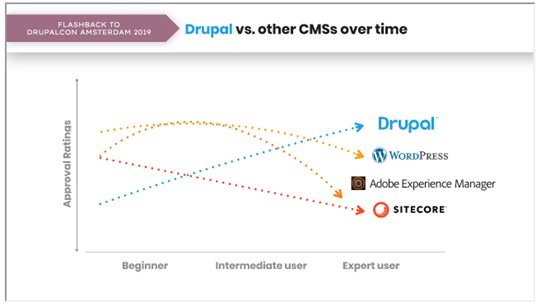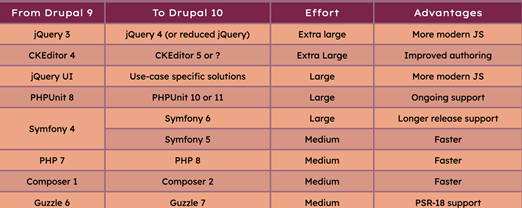
The success of open source projects relies heavily on the pillars of community and group collaborations. If strategic initiatives are not established, an open source project can lose focus. Strategic open source initiatives should aim to solve important problems through collaboration involving project stakeholders.
The Why and How of Drupal Strategic Initiatives
As one of the leading open source projects, Drupal's success relies heavily on the implementation of its various proposed strategic initiatives. Drupal's focus on strategic initiatives and continuous innovation has been with Drupal 7 and brought about massive architectural changes in Drupal 8, 9, and beyond that offer a platform for continued innovation on the web and an easy upgrade path for end users.
Dries Buytaert, Drupal Project Leader, sets the vision for Drupal's core strategic initiatives. These initiatives are supported by community collaboration and lead to significant developments driven by actions such as:
- Collaboration with core maintainers
- Usability studies and survey data
- A vision to build a leading open source digital experience platform
- Market relevance by improving editorial, developer and customer experiences
- Validation through broader community collaborations and discussions.
Once initiatives are proposed, they move on to the planned initiatives stage, where each initiative is nurtured with detailed plans and goals by a solid team of collaborators. When an initiative passes through this stage, it moves on to the active initiatives stage. This is where initiatives take shape and come to life.
Some of the most successful Drupal 8 initiatives, such as Twig and Bigpipe, did not follow the traditional process. However, following a carefully planned process will prevent time from being wasted on trivialities.
Past popular initiatives
In 2011, at DrupalCon Chicago, Dries announced that Drupal 8 would introduce core initiatives that would cause major changes to the Drupal architecture. To support the transition, each initiative would have some leaders involved in decision-making and coordination with Dries. Some popular initiatives included:
- Configuration Management Initiative (CMI): This was the first key initiative announced at DrupalCon 2011. The idea was to offer site builders more powerful, flexible, and traceable configuration management in the core of Drupal 8. As was planned, the Configuration Manager module is now a core Drupal 8 module that allows configurations to be deployed between different environments easily.
- Web Services and Contexts in Core Initiative: This initiative aimed to embrace a modern web and turned Drupal into a first-class REST server with a first-class content management system (CMS). The result? Drupal is now a competent REST server that provides the ability to manage content entities via HTTP requests. This is part of why Drupal has been the leading CMS for decoupled experiences for several years.
- Layout Initiative – The focus of this initiative was to improve and simplify the site creation experience for non-technical users, such as site creators and content authors. This initiative came to life in Drupal 8 through the introduction of the Layout Discovery API (An API plugin for Layout) in v.8.4 and the Layout Builder module (a complete layout management solution) in the core of v.8.5.
- Media Initiative: The goal was to release a rich, intuitive, and easy-to-use API-based media management solution with extensible media functionality in the core. This resulted in the addition of the Media API (which manages various operations on media entities) and Media Library (a rich digital asset management tool) to the Drupal 8 core.
- Drupal 9 Readiness Initiative - The goal of this initiative was to have Drupal 9 ready by June 3rd, 2020, so that Drupal 7 and 8 users would have at least 18 months to upgrade. Since Drupal 9 is just a clean version of the latest Drupal 8 release (8.9), the idea was to update dependencies and remove any deprecated code. And as planned, Drupal 9 was successfully released on June 3rd, 2020. Drupal 8-compatible modules were ported to Drupal 9 faster than any major version upgrade in Drupal history, with over 90% of the top 1,000 modules already ported (and many of the rest now deprecated).
New strategic initiatives
Fast forward to 2021, where everything is virtual. DrupalCon North America was a first-of-its-kind “Initiative Days” event added to traditional DrupalCon content. Previously, initiatives were proposed during the Dries Note session, but this time, the initiatives were more interactive and detailed. Attendees at DrupalCon North America 2021 were able to learn about an initiative and participate in building components and contributing to the project.
The initiative of decoupled menus
Dries proposed the Decoupled Menus Initiative in his keynote speech during DrupalCon Global 2020. While the broader intention of this initiative is to make Drupal the best decoupled CMS, to achieve the broader goal, the project chose to work on decoupled menus as a first step because menus are used in all projects and are not easy to implement in decoupled architectures.
The objectives of this initiative are to create APIs, documentation and examples that can:
- Provide JavaScript front-end developers with the best way to integrate Drupal managed menus into their front-ends.
- Provide site builders and content editors with an easy-to-use experience to create and update menus independently.
This is because without web services for decoupled menus in the core of Drupal, JavaScript developers are often forced to code menu items. This makes it really difficult for a non-developer to edit or delete a menu item without involving a developer. The developer must make the change, compile the JavaScript code, and then deploy it to production. With the Decoupled Menus Initiative, the developer can easily eliminate all of these steps and many lines of code using Drupal's HTTP APIs and JavaScript-focused resources.
The most important idea is to establish patterns and a roadmap that can be adapted to solve other decoupled problems. At DrupalCon 2021, on Decoupled Menus Initiative day, April 13, the two were able to learn about their situation and get involved by creating custom menu components and contributing them to the project.
The Out-Of-The-Box or easy-to-use initiative.
During DrupalCon 2019 in Amsterdam, CMS users were asked about their perceptions of their CMS. The research found that beginners do not favor Drupal as much as intermediate and expert level users. However, the opposite was true for other CMS users; they seemed to like their CMS less over time.

So the goal of the Easy Out-Of-The-Box initiative is to make Drupal easy to use, especially for non-technical and beginner users. It is an extension of the great work that has been done for Layouts, Multimedia, and Claro. Layout Builder’s low-code design flexibility, robust media content management, and Claro’s modern and accessible administrative user interface combine to empower less technical users with the power that Drupal has under the hood.
This initiative bundles all three features into a single initiative and aims to provide a pleasant user experience. Ease of use can help attract new and novice users to Drupal. On April 14, Drupal Con North America's Easy Out-Of-The-Box initiative day, initiative leaders discussed the initiative and its current progress.
Automated Updates Initiative
The results of a 2020 Drupal survey revealed that automated updating was the most requested feature. Updating a Drupal site manually can be tedious, expensive, and time-consuming. Fortunately, the initiative team has been at this task since 2019, when the first prototype of the Automated Update System was developed as a contribution module. The initiative’s focus now is to bring this feature into Drupal core. As easy as it may sound, there is a lot more work to do to:
- Ensure site readiness for a safe upgrade
- Integrate composer
- Check for updates with package signing
- Safely apply updates so they can be rolled back in case of errors
In its first incarnation, the focus is on Drupal Core patch releases and security updates, but the intention is to also support the contributed modules ecosystem.
The initiative aims to make things easier for small and medium-sized businesses that sometimes overlook the importance of updating their Drupal site or struggle with the manual process. The Automated Updates Initiative day took place on April 15 at DrupalCon North America.
Drupal 10 Readiness Initiative
With the release of Drupal 10 not too far away (as early as June 2022), the community is preparing to welcome a more modern version of Drupal. Drupal now integrates more third-party technologies than ever before. Dependencies like Symfony, jQuery, Guzzle, Composer, CKEditor, and more have their own release cycles that Drupal must align with.

The objective of the initiative is to prepare Drupal 10, and this implies:
- Drupal 10 Released on Time
- Achieve compatibility with the latest versions of dependencies for security
- Deprecate dependencies, libraries, modules, and themes that are no longer needed and remove them from the Drupal 10 core.
At the Drupal 10 Readiness Initiative Day on April 16, you learned about recommended tools to efficiently upgrade your websites and modules from Drupal 9 to Drupal 10. There are several things you can do to help improve Drupal. Content authors had the opportunity to take a look at the new CKEditor 5, its new features and improved editing experiences.
DrupalCon
Drupal is celebrating its 20th year and its evolution into more relevant and easier-to-adopt open source software. Leading an evolution is nearly impossible without taking strategic initiatives. While initial initiatives were not focused on delivering great user experiences, today, ease of use and out-of-the-box experience are the most important goals for Drupal.
DrupalCon North America, hosted by the Drupal Association, is the largest Drupal event of the year. Drupal experts, enthusiasts and users gathered virtually from April 12 to 16, 2021, shared lessons learned and best practices, collaborated to create better and more engaging digital experiences.
The Drupal Association is a nonprofit organization focused on accelerating Drupal, fostering the growth of the Drupal community, and supporting the project's vision of a safe, open web for all. DrupalCon is the primary funding source for the Drupal Association. Support and attendance at DrupalCon make the work of the association possible.
Translated from: https://opensource.com/article/21/4/drupal-updates
